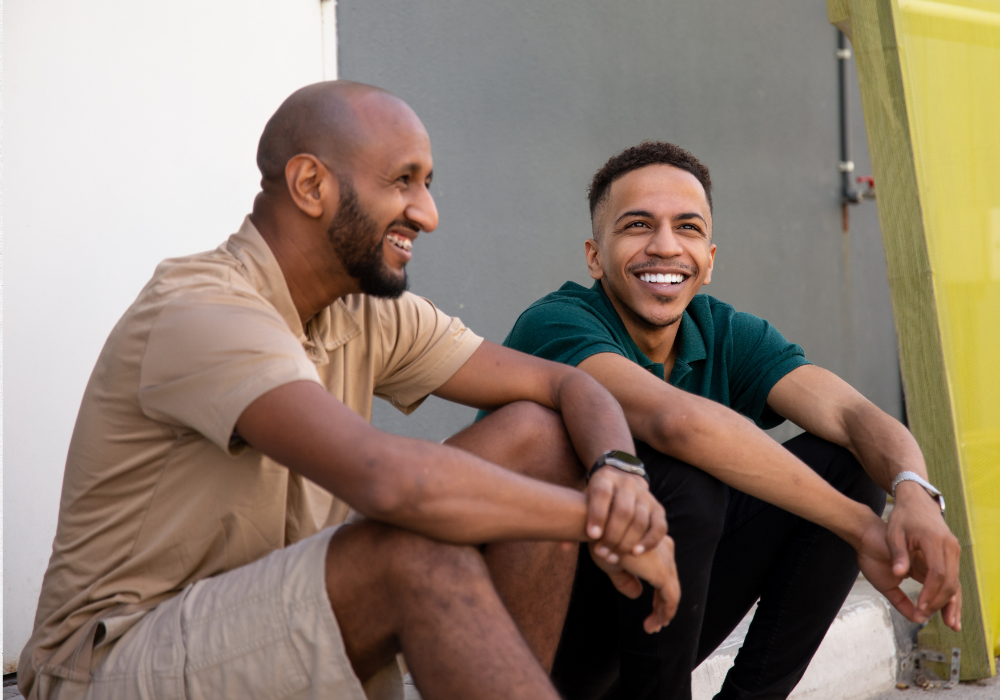Community is a form of resistance when everything feels transactional.

Capitalism doesn’t just drain your time and energy—it actively chips away at your ability to connect. When work hours bleed into evenings, when rest feels like laziness, and when every relationship is filtered through productivity, it’s no wonder genuine friendship feels out of reach. We weren’t built to go it alone, but the systems we live in keep pushing us that way.
Friendship shouldn’t feel like a luxury, a networking opportunity, or one more thing on a to-do list. It should be grounding. Safe. Reciprocal. But in a culture that values performance over presence, building real connection takes intentional, sometimes uncomfortable effort. These aren’t quick fixes or hacks. They’re quiet acts of rebellion—ways to reclaim community in a world that profits from keeping us isolated.
1. Treat friendship like maintenance, not a milestone.

We tend to treat friendships like fixed achievements—something we “have” once we’ve made a good connection. But relationships aren’t static. They need upkeep, check-ins, reminders, and flexibility. Waiting for the perfect time to “catch up” often means it never happens. Real connection doesn’t require a big plan—just intention.
Capitalism teaches us to focus on results. Friendship doesn’t work that way. Something as small as a check-in text can mean more than we think, according to the American Psychological Association, which found that people often underestimate how much these gestures are appreciated. So does sending a dumb meme or checking in after a rough week.
You don’t need a three-hour dinner to prove you care. You just need to keep showing up, imperfectly and consistently. Maintenance might not sound romantic, but it’s where real friendship lives.
2. Stop outsourcing connection to your group chats.

Group chats can be hilarious, comforting, and deeply meaningful. But they’re not a replacement for true presence. While group chats are popular, they may not provide the depth of connection that one-on-one interactions offer, as noted by Isabel Goddard in a 2023 article for the Pew Research Center. Still, if you never go beyond the surface—never have a one-on-one or check in privately—those connections can quietly fade.
In a culture that prioritizes speed and efficiency, group chats give the illusion of closeness without the vulnerability. Real friendship needs space for deeper conversation, silence, and the messy stuff that doesn’t fit into a punchline. Use your group chats as a jumping-off point—not the whole relationship.
3. Build friendship into your daily rhythms—not just your free time.

Waiting for a day when your calendar clears up? It probably won’t. Americans are spending about 53 minutes more at home each day than they did before the pandemic, engaging less in social activities, per Health writer Maggie O’Neill. Instead of trying to wedge friends into your leftovers, try weaving them into your regular routines.
Call someone while you’re doing dishes. Walk with a friend instead of working out alone. Co-work with someone quietly, even if you’re doing different things. Friendship doesn’t have to be a big production. It just needs to fit into the life you already live. The more you make space for connection in your everyday habits, the less friendship feels like a burden—and the more it becomes part of your actual life.
4. Get comfortable being the one who reaches out first.

Reciprocity matters—but it doesn’t always happen in perfect turns. If you’re waiting for a friend to make the next move, and they’re doing the same, nobody wins. In a world where everyone’s drained, burned out, or distracted, reaching out first is a quiet act of care.
That doesn’t mean overextending or chasing people who consistently don’t show up. But if you care about someone, don’t let pride or symmetry keep you from initiating. Everyone’s carrying invisible weight. Being the one who texts first, who plans something, who checks in—it’s not desperate. It’s generous. And more often than not, it’s deeply appreciated.
5. Stop filtering friendship through productivity.

Our culture trains us to center productivity in everything—career networking, shared projects, goal-aligned collaborations. But friendship doesn’t need an agenda to be valuable. It doesn’t have to make you “better,” help your career, or teach you something. It just has to make you feel more human. It’s okay to just hang out, waste time, and be unproductive together. You don’t have to monetize your hobbies or turn your social life into a brand.
Some of the most meaningful friendships come from doing absolutely nothing—and letting that be enough. Connection that isn’t tied to outcome is radical in a world that demands results.
6. Let friendships ebb and flow without assuming failure.

Life is chaotic. People move, schedules change, mental health dips. And sometimes even the best friendships go quiet for a while. That doesn’t always mean something’s wrong.
A capitalist mindset frames consistency as proof of worth—but human connection doesn’t work on fixed timelines. It’s okay if your friendships stretch, breathe, or shift form. Some people are daily texters, others drop in every few months with the exact right words. If the bond is real, it can adapt. Letting go of rigid expectations doesn’t mean letting go of care. It means giving space for friendship to survive in real life—not just in theory.
7. Make peace with imperfect timing and messy schedules.

Capitalism thrives on rigidity—on perfectly blocked calendars and “work-life balance” that rarely balances anything. Friendship doesn’t fit neatly into that. Sometimes you’ll reschedule three times before you finally get together. Sometimes you’ll only have 20 minutes. That doesn’t make the connection less real.
Instead of aiming for ideal conditions, meet each other where you are. Talk while commuting. Send voice notes between tasks. Let a chaotic week be something you share, not something that separates you. Waiting for everything to calm down can become an excuse not to connect at all. But connection that happens amid the chaos? That’s the stuff that actually sticks.
8. Stop expecting friendships to mirror romantic timelines.

Friendships don’t follow the same trajectories as romantic relationships. They don’t come with anniversaries, exclusivity, or built-in milestones. And because of that, it’s easy to feel unsure—like if it’s not deep yet, it’s doomed. But friendship builds in layers, slowly and often unevenly. It’s not always clear when you’ve crossed into something lasting, and that ambiguity can feel unsettling.
One month, you might talk constantly. The next, you might barely connect. That doesn’t mean you failed. It just means friendship lives outside the rules we’re used to applying to relationships.
The best ones aren’t linear—they’re elastic. They grow in unpredictable directions. They pause and restart. They shift with your lives. Let them stretch. Let them take time. Let them surprise you. That’s how the real ones last.
9. Learn how to name hurt instead of ghosting people.

When a friend disappoints you, says something off, or fades away, it’s tempting to just disappear. Ghosting is easy. But naming hurt—saying, “Hey, that didn’t sit right”—is what builds something real. We’re taught to avoid conflict or pretend we’re unbothered, especially in friendships, where the rules are murkier than in romantic relationships.
But silence rarely brings clarity. It just creates distance. You don’t have to start a huge confrontation, but honesty opens the door to repair. It also shows you who’s capable of growing with you. Some people won’t be—but the ones who are will meet you in that discomfort. And those are the friendships worth holding onto.
10. Embrace low-maintenance friendships that still run deep.

Not every close friendship requires constant contact. Some of the most solid relationships are the ones that can pause for weeks and pick up like nothing happened. These friendships aren’t low-effort—they’re high-trust. They assume good intentions, not absence of care.
Capitalism tells us that consistent output equals value. But connection doesn’t always work that way. If someone’s life is full, and yours is too, you can still hold each other with ease and softness. A friendship that feels calm—not needy, not urgent—isn’t lacking. It’s durable. And that kind of stability is deeply radical in a world that’s always demanding more.
11. Recognize friendship as emotional infrastructure—not extra credit.

Friendship isn’t a bonus feature of adulthood—it’s foundational. It holds us up when institutions fail, when work drains us, and when family isn’t safe. In a capitalist world that isolates people by design, friendships are part of our survival strategy. They’re not side characters in your life story—they’re the actual support beams.
The more we treat friendship as essential, the more resilient we become. It’s not indulgent to make time for it. It’s not weak to need it. If anything, it’s the strongest thing you can build when everything else feels uncertain. Friendship isn’t just personal—it’s resistance. And it’s worth protecting.